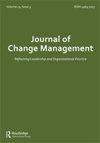Leadership in the Implementation of Change: Functions, Sources, and Requisite Variety
IF 3
Q2 MANAGEMENT
引用次数: 23
Abstract
ABSTRACT Despite leadership being considered essential to successful organizational change, reviews of empirical research on the subject reveal inconsistencies in the approaches to, and measurements of, both leadership and its impact on change outcomes. The study and development of leadership should reach beyond the simple focus on individual leaders and ultimately broaden our view of how the most meaningful impact can be made. Toward this end, a general framework of leadership in the implementation of change is provided. Starting from a functional perspective, it is proposed that leadership is provided by one or more leadership sources that independently or collaboratively enact a configuration of four leadership functions through specific behaviours from three behavioural meta-categories. It is additionally argued that leadership effectiveness – and the success of change – is a product of the degree to which the configuration of functions enacted sufficiently addresses the variety of situations leadership sources encounter. In this regard, the integrative framework offered here focuses primarily on what Rost [(1991). Leadership for the twenty-first century. Praeger] categorizes as the peripheral elements of leadership theory.变革实施中的领导力:功能、来源和必要的多样性
摘要尽管领导力被认为是成功组织变革的关键,但对该主题的实证研究表明,在领导力及其对变革结果的影响的方法和衡量方面存在不一致。领导力的研究和发展应该超越对单个领导者的简单关注,并最终拓宽我们对如何产生最有意义的影响的看法。为此,提供了一个实施变革的总体领导框架。从功能的角度出发,提出领导力是由一个或多个领导力来源提供的,这些来源通过三个行为元类别中的特定行为独立或协作地制定四个领导力功能的配置。此外,有人认为,领导力的有效性——以及变革的成功——是制定的职能配置在多大程度上充分应对领导力来源遇到的各种情况的产物。在这方面,这里提供的综合框架主要集中在Rost[(1991).二十一世纪的领导力.Praeger]将其归类为领导力理论的外围元素。
本文章由计算机程序翻译,如有差异,请以英文原文为准。
求助全文
约1分钟内获得全文
求助全文
来源期刊

JOURNAL OF CHANGE MANAGEMENT
MANAGEMENT-
CiteScore
6.60
自引率
20.00%
发文量
14
期刊介绍:
Journal of Change Management is a multidisciplinary and international forum for critical, mainstream and alternative contributions - focusing as much on psychology, ethics, culture and behaviour as on structure and process. JCM is a platform for open and challenging dialogue and a thorough critique of established as well as alternative practices. JCM is aiming to provide all authors with a first decision within six weeks of submission.
 求助内容:
求助内容: 应助结果提醒方式:
应助结果提醒方式:


